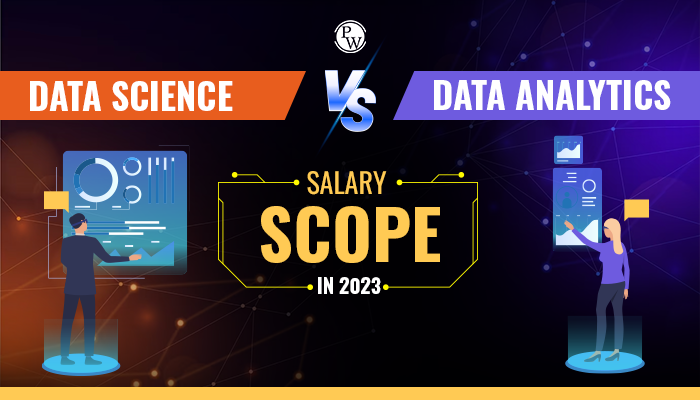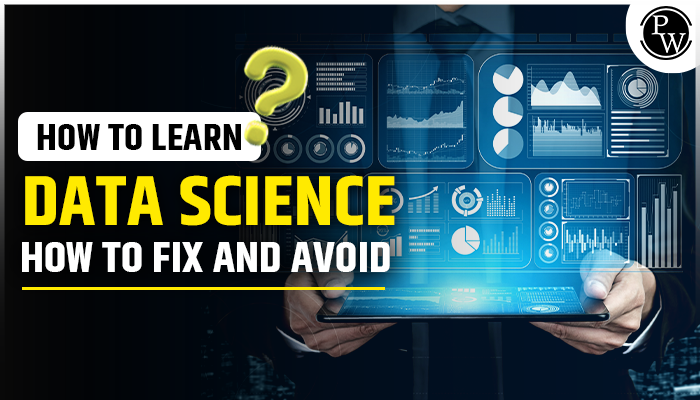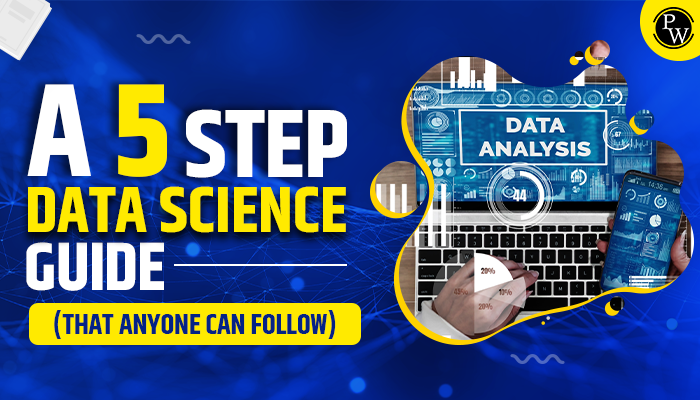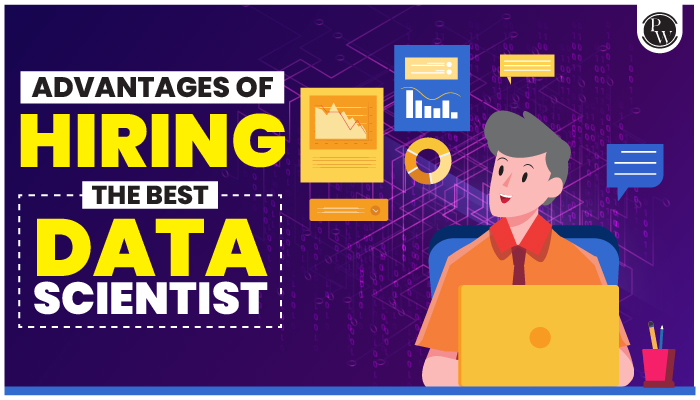In the age of big data, the terms Data Science vs Data Analytics are frequently used interchangeably, leading to some confusion about the distinctions between these two fields. While they share similarities and overlap in certain areas, data science courses and data analytics are distinct disciplines with different focuses and skill sets.
This article delves into the nuances of the difference between data science vs data analytics, exploring their unique characteristics, methodologies, and applications. By clarifying the distinctions between these two domains, we aim to provide clarity and insights into the roles and opportunities presented by data science and data analytics.
What Is Data Science?
Data scientists use mathematical, statistical, and machine-learning techniques to extract insights from data. They focus on cleaning, processing, and interpreting vast amounts of data, employing advanced data modelling processes, machine learning algorithms, and predictive models.
Data scientists design and develop prototypes, conduct custom analyses, and leverage sophisticated methodologies to uncover complex patterns and generate actionable insights. By employing cutting-edge technologies and statistical techniques, data scientists help organisations make data-driven decisions and gain a competitive edge in their respective industries.
Recommended courses.
What Is Data Analytics?
Data analytics, on the other hand, involves the examination of data sets to identify trends, draw conclusions, and make informed decisions. Data analysts collect and organise large volumes of data, utilizing tools and techniques to analyse and identify relevant patterns.
They employ statistical methods and exploratory data analysis to gain insights and provide valuable information for business strategies. Data analysts also play a crucial role in transforming complex insights into easily understandable visualisations, such as
- Charts and graphs,
- Enabling technical and non-technical stakeholders to grasp the key findings.
They aim to translate data into meaningful insights that drive organizational growth and efficiency.
The Overlapping Territory: Data Science VS Data Analytics
While we talk about data science vs data analytics, they have distinct focuses and methodologies, and their responsibilities often overlap. Data scientists and analysts collect, clean, and analyse data to derive actionable insights for decision-making.
However, data science tends to have a
- Broader scope,
- Encompassing advanced modelling techniques,
- Machine learning,
- And predictive analytics.
On the other hand, data analytics places greater emphasis on organizing and visualizing data to facilitate business understanding and decision-making.
| Feature | Data Science | Data Analytics |
| Coding Language | Python is the most commonly used language for data science, along with other languages such as C++, Java, Perl, etc. | Knowledge of Python and R Language is essential for Data Analytics. |
| Programming Skills | In-depth knowledge of programming is required for data science. | Basic Programming skills are necessary for data analytics. |
| Use of Machine Learning | Data Science uses machine learning algorithms to get insights. | Data Analytics does not use machine learning to get insight into data. |
| Other Skills | Data Science uses Data mining activities to get meaningful insights. | Hadoop Based analysis is used for getting conclusions from raw data. |
| Scope | The scope of data science is large. | The Scope of data analysis is micro, i.e., small. |
| Goals | Data science deals with explorations and innovations. | Data Analysis makes use of existing resources. |
| Data Type | Data Science mostly deals with unstructured data. | Data Analytics deals with structured data. |
| Statistical Skills | Statistical skills are necessary for the field of Data Science. | The statistical skills are of minimal or no use in data analytics. |
Responsibilities of Data Scientists
Data scientists play a pivotal role in unlocking the value hidden within vast data. They use their data science, statistical analysis, and machine learning expertise to extract actionable insights and drive data-driven decision-making. Let’s delve into the key responsibilities of data scientists and how they differ from data analysts in the realm of data science vs. data analytics.
Processing, Cleaning, and Validating Data:
Data scientists are responsible for ensuring the quality and integrity of data. They employ data preprocessing techniques to handle missing values, outliers, and inconsistencies, ensuring the data is clean and ready for analysis. By validating the integrity of the data, data scientists lay the foundation for accurate and reliable insights.
Performing Exploratory Data Analysis (EDA):
It also performs Exploratory Data Analysis on large datasets. They employ statistical methods and visualization techniques to gain a comprehensive understanding of the data. Exploring correlations, distributions, and patterns helps data scientists uncover insights and identify potential relationships within the data.
Data Mining and ETL Pipeline Creation:
Data scientists create Extract, Transform, and Load (ETL) pipelines to extract data from various sources efficiently, transform it into a suitable format, and load it into a data repository. Data mining techniques are applied to uncover valuable information, patterns, and trends within the data. Data scientists identify hidden patterns that can drive decision-making by employing algorithms and techniques, such as association rules, clustering, and anomaly detection.
Statistical Analysis and Machine Learning Algorithms:
It also helps in utilizing various statistical analysis techniques to gain insights from the data. They apply machine learning algorithms, such as logistic regression, k-nearest neighbours (KNN), random forest, and decision trees, to model and analyze complex relationships within the data. By leveraging these algorithms, data scientists can make predictions, classify data, and uncover valuable patterns.
Code Development and Automation:
Data scientists are proficient in programming languages like Python or R. They write code to automate repetitive tasks and build efficient ML libraries. This enables them to streamline data processing, analysis, and model deployment, saving time and enhancing productivity.
Gleaning Business Insights:
Data scientists bridge the gap between data and business objectives. They apply ML tools and algorithms to extract meaningful insights that have practical implications for the organization. By leveraging statistical modelling and predictive analytics, data scientists identify trends, make business predictions, and provide valuable stakeholder recommendations.
Identifying Emerging Trends:
Data scientists stay at the forefront of emerging technologies, methodologies, and trends in data science. They continuously explore new tools, algorithms, and approaches to stay updated with the evolving data landscape. By keeping a pulse on the latest advancements, data scientists can adapt their strategies and leverage new techniques for improved data analysis.
Responsibilities of Data Analysts
Data analysts play a vital role in transforming raw data into meaningful insights in data science vs data analytics. They are skilled in collecting, organizing, and analyzing data to uncover patterns and trends that drive informed decision-making. Let’s explore the key responsibilities of data analysts and understand their role in the broader context of data science vs data analytics.
Collecting and Interpreting Data:
Data analysts gather data from various sources, such as databases, surveys, or external APIs. They ensure data accuracy and reliability by conducting thorough data validation and quality checks. Data analysts comprehensively understand the collected data’s context and potential insights by interpreting it.
Identifying Relevant Patterns:
Data analysts employ analytical techniques to identify patterns, correlations, and relationships within a dataset. They explore statistical methods and data mining techniques to uncover valuable insights. By extracting meaningful information from the data, data analysts contribute to identifying trends, anomalies, and valuable patterns that can aid decision-making.
Data Querying Using SQL:
Data analysts’ proficiency in SQL (Structured Query Language) is crucial. They use SQL queries to extract specific data subsets, filter data based on certain criteria, and perform data aggregations. By leveraging SQL, data analysts can efficiently access and manipulate large datasets for analysis.
Experimenting with Analytical Tools:
Data analysts work with various analytical tools, including predictive, prescriptive, descriptive, and diagnostic analytics. They experiment with different techniques and methodologies to gain insights from the data. Using these tools, data analysts can uncover trends, make predictions, and provide actionable recommendations.
Data Visualization using Tools like Tableau and IBM Cognos Analytics:
Data analysts utilize data visualization tools like Tableau, IBM Cognos Analytics, or similar tools to present their findings effectively. They create visually appealing and interactive dashboards, charts, and graphs to communicate complex information clearly and concisely. Data visualization enables stakeholders to understand and interpret the data easily.
Data Science Vs Data Analytics: Salary
When considering a career in the field of data, one of the factors that often comes to mind is salary. While we talk about the Data science vs data analytic salary, it has been in high demand due to the increasing importance of data-driven decision-making in organizations.
Check out the Data science vs data analytics salary in india in the table mentioned below.
| Data science vs data analytics salary | |
| Data Analyst Salary | Data Scientist Salary |
| As per Glassdoor, a Data Analyst earns nearly $70,000 per annum in the United States. | According to Glassdoor, the average salary of a Data Scientist in the US is $100,000 per annum. |
| As per Glassdoor, the average salary of a data analyst in India is 6 Lac rupees per annum. | In India, the average salary of a Data Scientist is 9 Lac rupees per annum. |
Data Science Vs Data Analytics Core Skills
| Skill Sets | Data Analysts | Data Scientists |
| Mathematics | Basic understanding of statistical analysis | Proficiency in probability, multivariate calculus, linear algebra |
| Statistics | Statistical analysis, data modelling | Advanced statistical modelling, hypothesis testing |
| Programming | Proficiency in R or Python programming | Proficiency in R, Python, Java, Scala, Julia, SQL, MATLAB |
| Database Management | Data querying using SQL, basic database skills | Advanced database management, data wrangling |
| Data Mining | Data mining techniques, pattern identification | Advanced data mining, predictive modelling |
| Data Visualization | Basic data visualization skills | Proficient in creating informative and visually appealing visualizations |
| Machine Learning | Familiarity with basic ML techniques | In-depth knowledge of machine learning algorithms and models |
| Big Data Platforms | N/A | Experience with Apache Spark, Hadoop, etc. |
Which Is Better – Data Science or Data Analytics
In today’s data-driven world, businesses are experiencing substantial profits and growth by harnessing insights derived from their organizational data. This trend has led to a significant surge in job opportunities for data scientists, data analysts, and data engineers across various industries.
While we talk about data science vs data analytics, Data has emerged as a critical asset for organizations, and both Data Science and Data Analytics play pivotal roles in extracting valuable insights from the available data. While they share a common goal of generating insights, their approaches and objectives differ.
Data Science revolves around analyzing raw and unstructured datasets to uncover actionable insights.
- It focuses on discovering answers to questions that organizations may not even know to ask.
- Data scientists employ various methods and tools to extract meaningful information, ranging from statistical analysis and machine learning to predictive modelling and data mining.
On the other hand, Data Analytics encompasses the processes of examining available datasets and conducting statistical analyses to derive actionable insights.
- Its primary objective is to solve current business problems using existing data, presenting information in a visual format that is easily understandable for stakeholders.
- Data analytics strives to deliver results that lead to immediate improvements and enable data-driven decision-making.
However, data science vs data analytics is in high demand in the job market. They offer promising career prospects in terms of scope and salary. Organizations recognize the value of professionals who can effectively analyze data and translate it into meaningful insights to drive strategic decision-making and enhance business performance.
FAQs
Q.1 Which pays more for big data or data science?
Ans. Data science tends to have higher salary potential than big data due to its broader scope and the specialized skill set required. However, salary can vary depending on factors such as industry, experience level, location, and specific job responsibilities.
Q.2 Can a data analyst work as a data scientist?
Ans. Yes, with additional training and acquiring the necessary skills, a data analyst can potentially transition into a data scientist role, given their overlapping skill sets and analytical background.
Q.3 Data science vs data analytics which is better?
Ans. Whether data science or analytics is better depends on individual preferences and career goals. Data science involves more advanced techniques, such as machine learning and predictive modelling, offering a wider range of possibilities. Data analytics focuses on extracting insights from data, making it suitable for those who prefer a more focused approach.
Q.4 How to find the best data science-certified courses?
Ans. To find the best data science-certified course
- Visit PW skills
- Log in with your phone number
- Choose the desired course and pay the fee.
Q.5 As a beginner, should I first learn data analytics or data science?
Ans: For beginners with no prior programming knowledge, it is advisable to start with learning data analytics tools such as Ms-Excel and Power BI. These tools provide a solid foundation in data analysis and visualization, making it a good starting point before diving into more advanced concepts in data science.
Recommended Post
Data Science Interview Question and Answer
Data Science vs Machine Learning and AI






